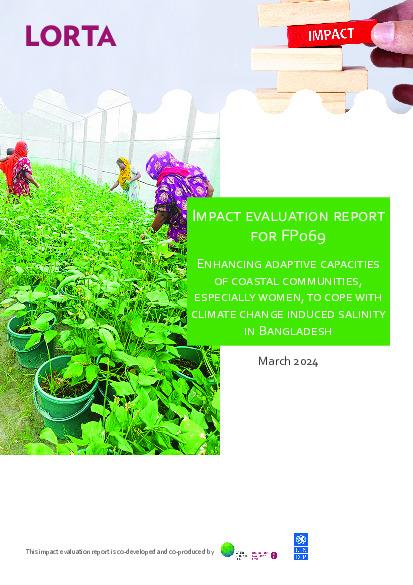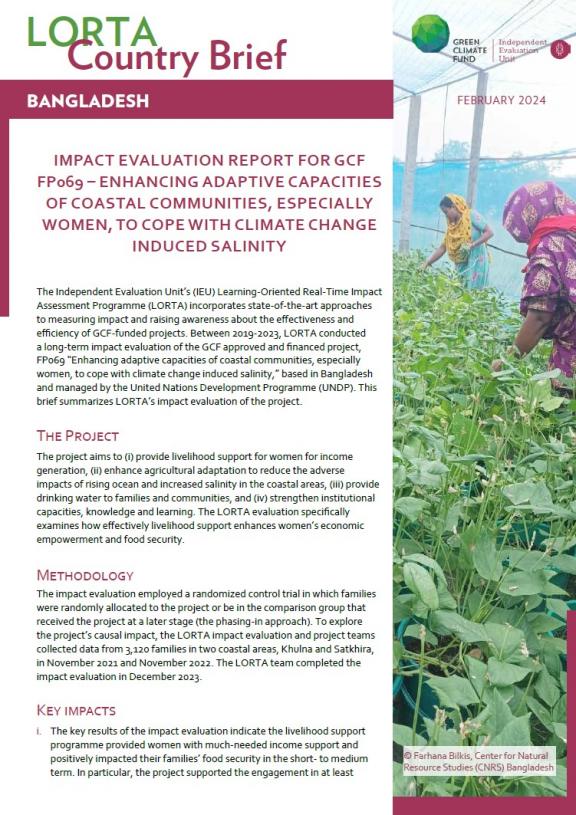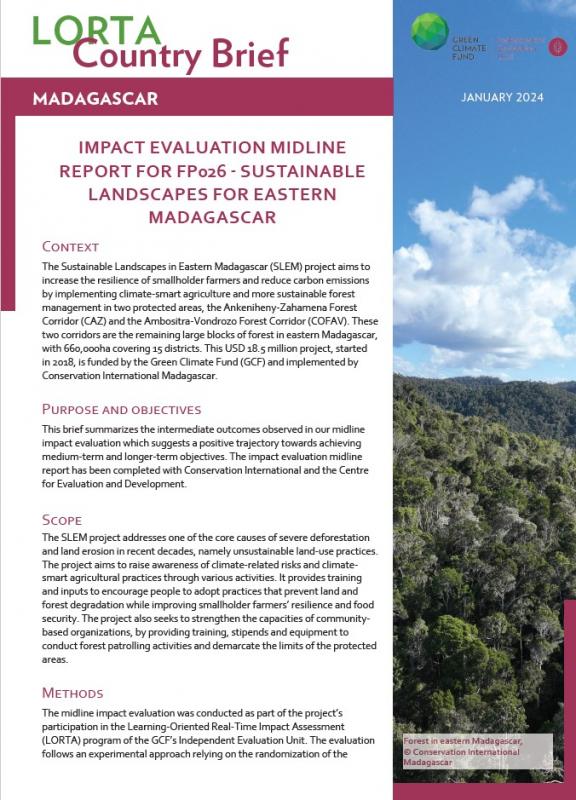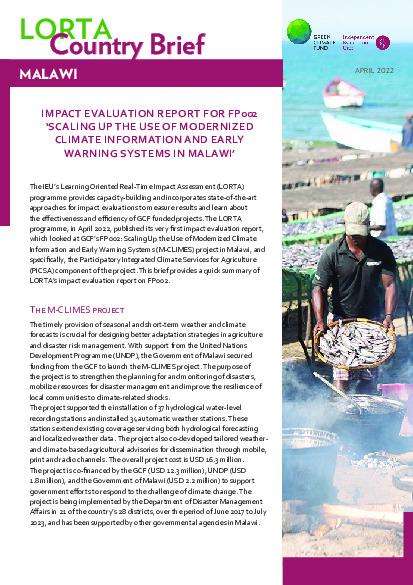LORTA: Impact evaluations
Documents
The LORTA team produces resources that assess the impact of climate interventions, sharing knowledge and evidence with the international community.
Key documents
- IEU Brief: GCF PROJECTS: Who benefits? How much? How? When? How do we know?
- Funding proposal review checklist for measuring impact
- Portfolio Brief
2023
2022
2021
2020
2019
2018
- Synthesis Report Phase I 2018
- 2-page GEvalNote | Available in English, Spanish and Arabic*
- 4-page GEvalBrief | Available in English, Spanish and Arabic*
List of publications
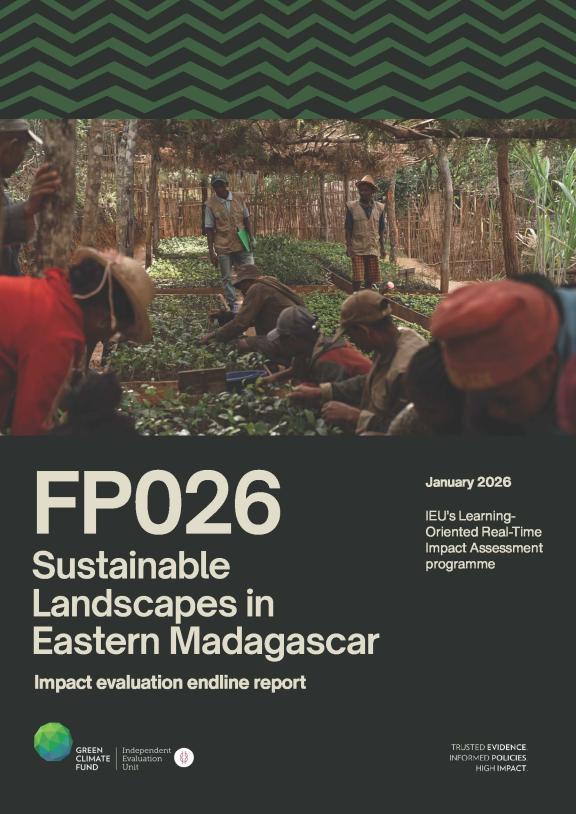
Impact evaluation endline report for FP026: Sustainable Landscapes in Eastern Madagascar
January 2026
This report presents the endline findings of an impact evaluation of the Sustainable Landscapes in Eastern Madagascar project, which aimed to reduce deforestation and strengthen climate resilience through sustainable forest management and climate-resilient agriculture. Using a rigorous difference-in-differences design and panel data from 1,603 households surveyed in 2019 and 2025, the evaluation finds reductions in deforestation, increased adoption of year-round farming systems, and higher...
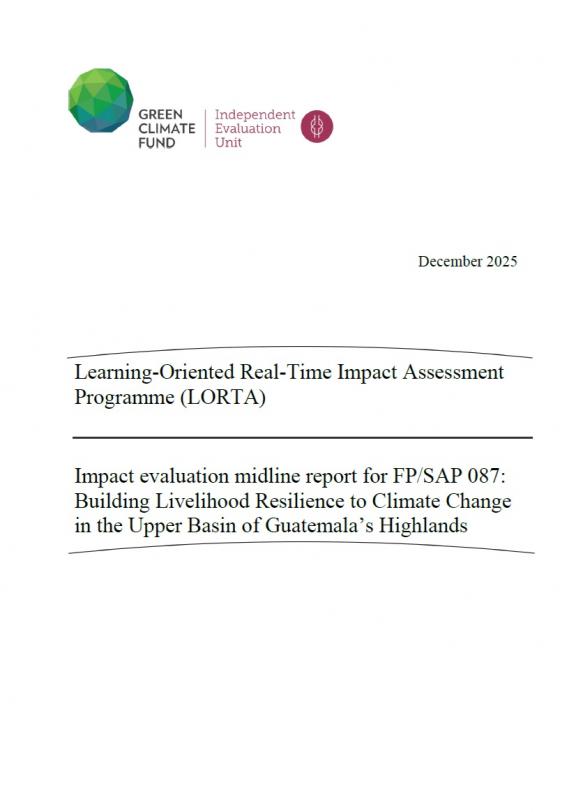
Impact Evaluation Midline Report for FP/SAP 087: Building Livelihood Resilience to Climate Change in the Upper Basin of Guatemala’s Highlands
December 2025
This report presents the midline findings of the project "Building Livelihood Resilience to Climate Change in the Upper Basins of Guatemala’s Highlands," implemented since 2021 to strengthen ecosystem and water management, diversify livelihoods, and enhance household resilience to climate-related shocks. The evaluation applies a quasi-experimental design and draws on data from 1,256 households across treatment and comparison micro-watersheds. Results show increased vulnerability to climate...
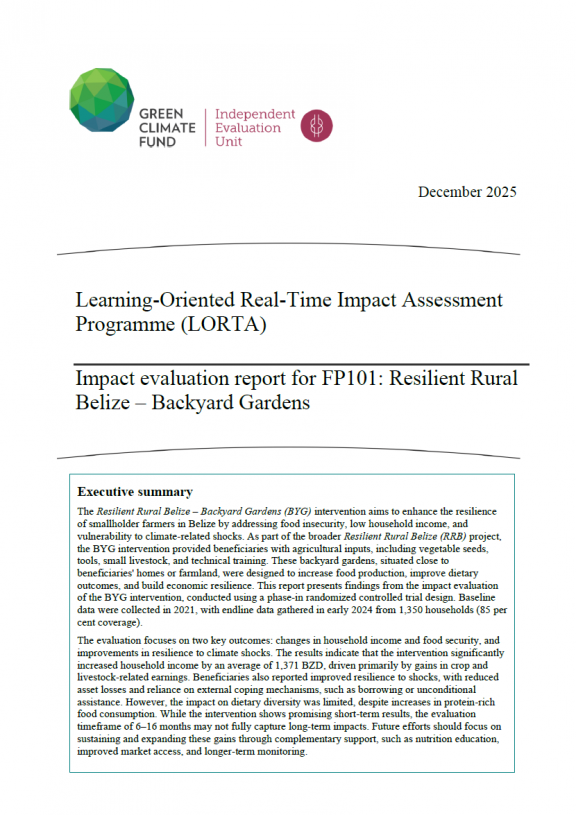
Impact evaluation report for FP101: Resilient Rural Belize – Backyard Gardens
December 2025
This impact evaluation, based on a phase-in randomized controlled trial, draws on baseline data collected in 2021 and endline data gathered in early 2024 from 1,350 households (representing 85 per cent coverage). It examines the programme’s effectiveness in improving household income and food security, as well as strengthening resilience to climate shocks. The findings show that the intervention increased incomes by an average of 1,371 BZD and strengthened resilience to climate shocks, with...
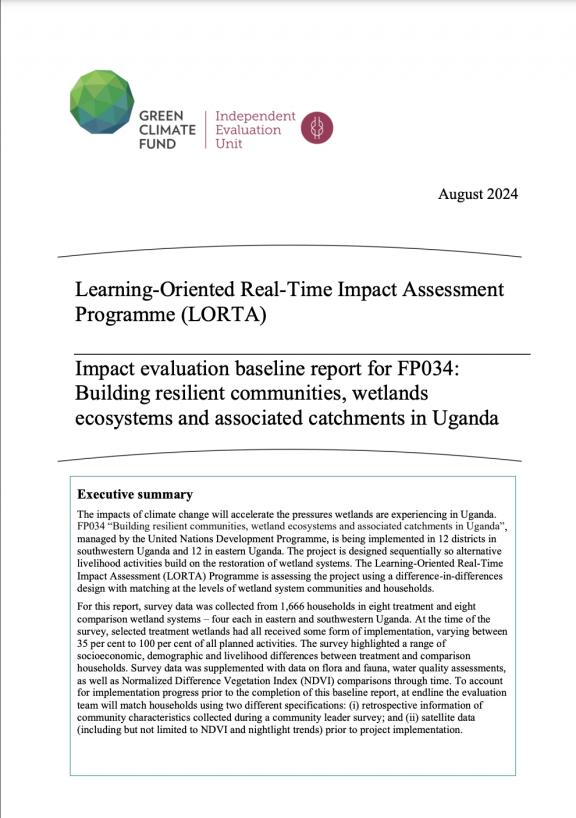
Impact evaluation baseline report for FP034: Building resilient communities, wetlands ecosystems and associated catchments in Uganda
February 2025
This baseline report evaluates FP034, a wetland restoration and community resilience project in Uganda, implemented by the United Nations Development Programme (UNDP). Assessed under the Learning-Oriented Real-Time Impact Assessment (LORTA) Programme, the study uses a difference-in-differences design with matching to measure project impact. Data was collected from 1,666 households across treatment and comparison wetland systems in eastern and southwestern Uganda, alongside flora and fauna...
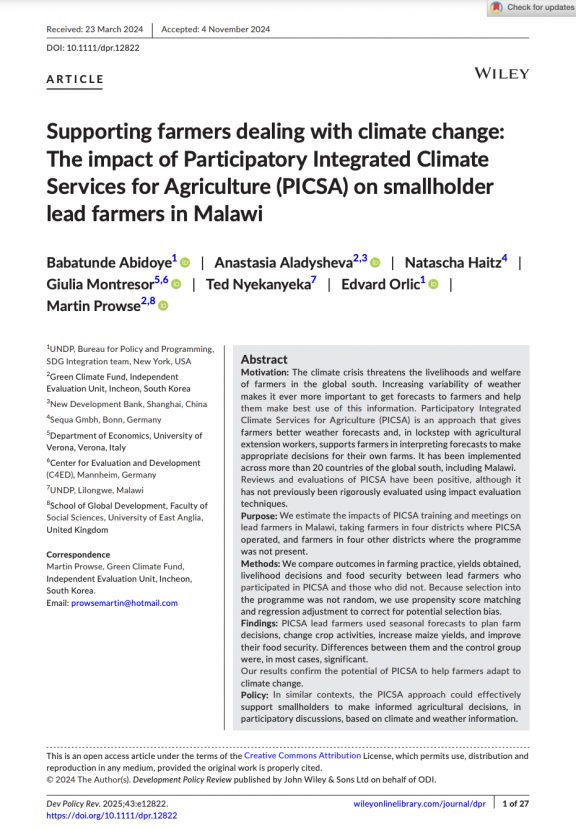
Supporting farmers dealing with climate change: The impact of Participatory Integrated Climate Services for Agriculture (PICSA) on smallholder lead farmers in Malawi
January 2025
This document explores the impact of Participatory Integrated Climate Services for Agriculture (PICSA) on lead farmers in Malawi, addressing how this innovative approach equips smallholders to adapt to the challenges of climate change. PICSA integrates localized weather forecasts with farmer training and participatory decision-making to optimize agricultural outcomes. By comparing lead farmers who participated in PICSA with those who did not, the study reveals significant improvements in...
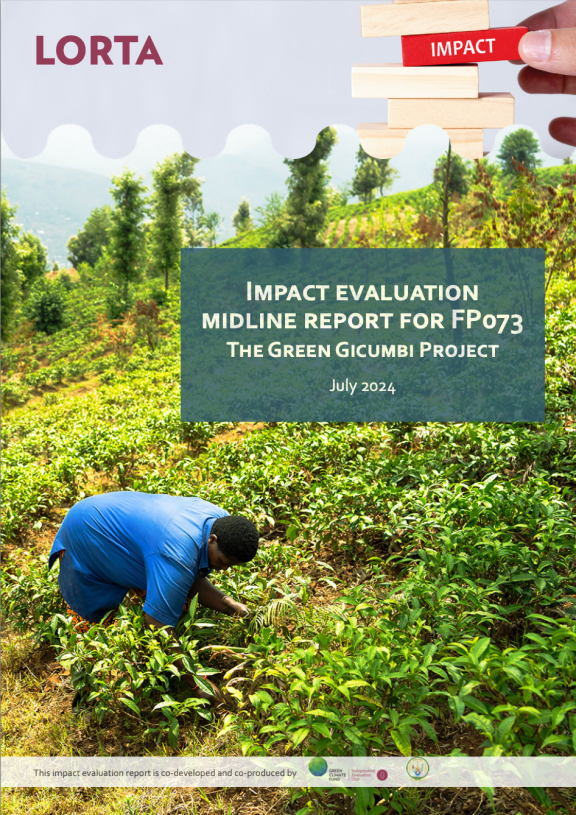
Impact Evaluation Midline Report for FP073 - Strengthening climate resilience of rural communities in Northern Rwanda
July 2024
This is a midline impact evaluation report of the GCF project FP073 Strengthening climate resilience of rural communities in Northern Rwanda, commonly known as Green Gicumbi Project. The project aims to restore and enhance ecosystem services in one of the sub-catchments of the degraded Muvumba watershed, increase the capacity of communities to renew and sustainably manage resources, and support smallholders to adopt climate resilient agriculture. The project has been evaluated at midterm...
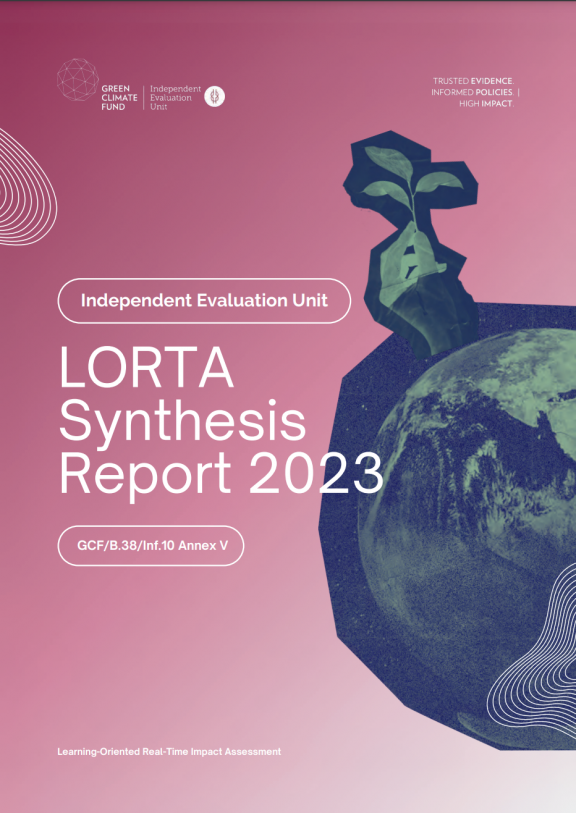
LORTA Synthesis Report 2023
February 2024
This document provides a report of the key activities of the LORTA Programme for 2023. It is Annex 5 of a report of the IEU's key activities for the period of January to December 2023, which reports on the IEU outputs and achievements in line with the Independent Evaluation Unit 2023 Work Plan and Budget and Update of its three-year work plan and objectives (document GCF/B.34/16).
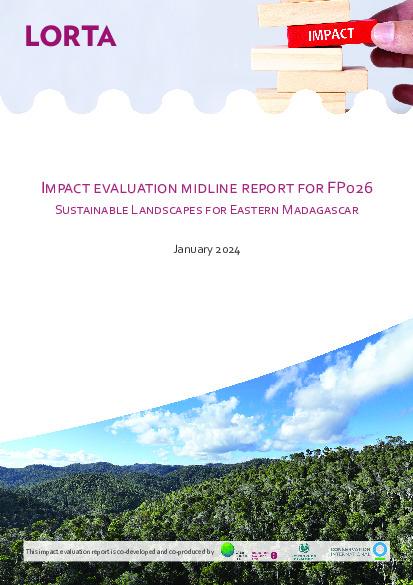
Impact Evaluation midline report for FP026 - Sustainable Landscapes for Eastern Madagascar
January 2024
The Sustainable Landscapes for Eastern Madagascar (SLEM) project (FP026) aims to increase the resilience of smallholder farmers and reduce carbon emissions by implementing climate-smart agriculture and sustainable forest management in two corridors covering 660,000 hectares over 15 districts. These corridors are the two remaining large blocks of forest in the eastern part of Madagascar. To develop resilient farming communities, SLEM directly supports vulnerable smallholder farmers to adopt...
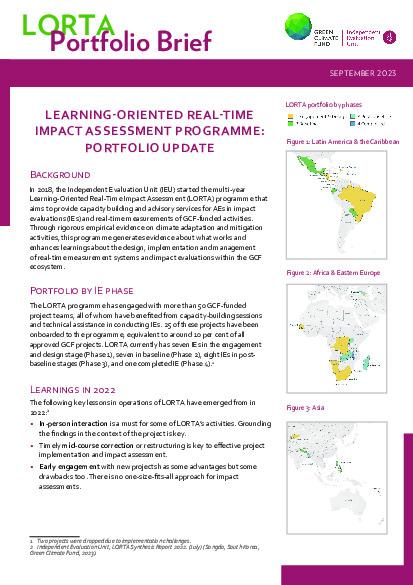
LORTA Portfolio Update
September 2023
The multi-year Learning-Oriented Real-Time Impact Assessment (LORTA) programme keeps track of the impact of GCF investments. Its goal is to assist GCF projects measure their impact in lowering greenhouse gas emissions and enhancing resilience to climate change, and if so, by how much. LORTA’s assistance includes, among other things, building and clarifying theories of change, co-building real-time and longer term measurement systems and helping projects use quantitative and qualitative...
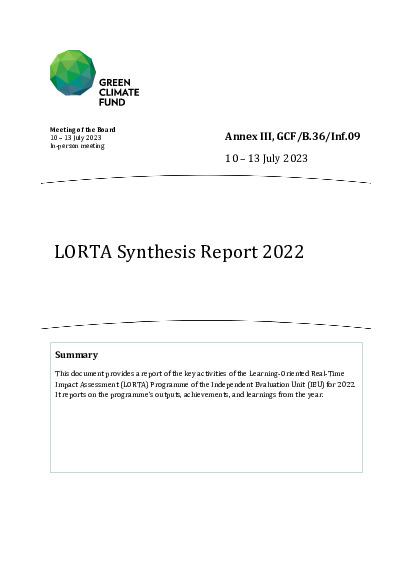
LORTA Synthesis Report 2022
June 2023
This document provides a report of the key activities of the LORTA Programme for 2022. It is Annex III of a report of the key activities of the Independent Evaluation Unit (IEU) for the period of 1 January to 30 April 2023. It reports on the IEU’s outputs and achievements in line with its Board-approved work plan for 2023.
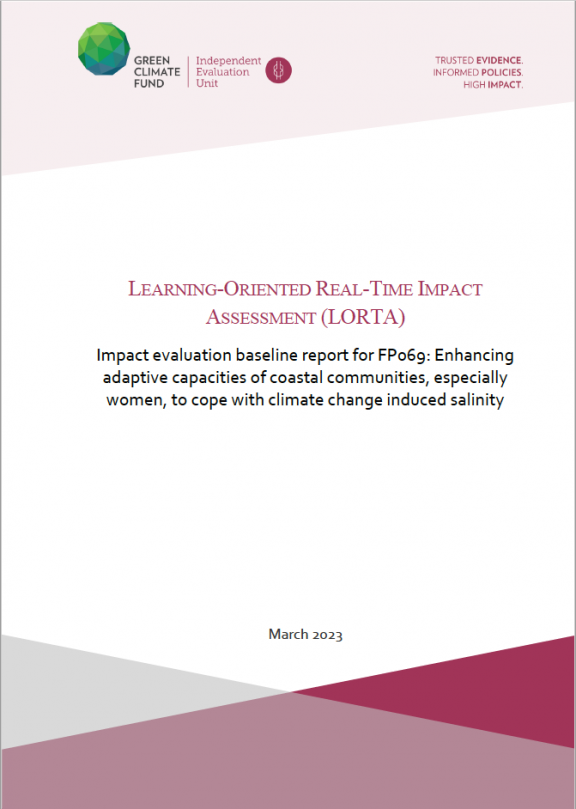
Impact evaluation baseline report for FP069: Enhancing adaptive capacities of coastal communities, especially women, to cope with climate change induced salinity
March 2023
This report presents the baseline data for “Enhancing adaptive capacities of coastal communities, especially women, to cope with climate change induced salinity”, a project funded by the Green Climate Fund and implemented by the United Nations Development Programme in Bangladesh. This baseline report provides insights and summary statistics about the socioeconomic situation of project households before project implementation.
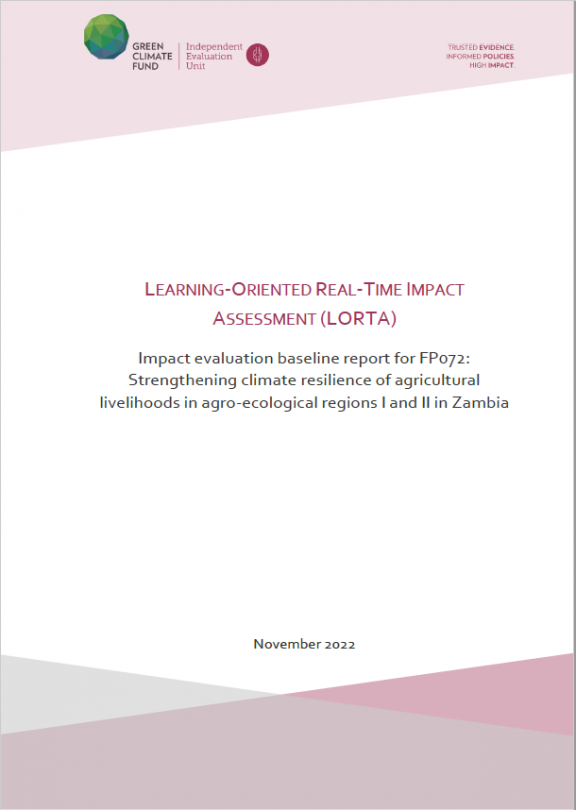
Impact evaluation baseline report for FP072: Strengthening climate resilience of agricultural livelihoods in agro-ecological regions I and II in Zambia
November 2022
This report presents the baseline data for “Strengthening climate resilience of agricultural livelihoods in agro-ecological regions I and II in Zambia” (SCRALA), a project funded by the Green Climate Fund and implemented by the United Nations Development Programme in Zambia. The report includes descriptive statistics collected for the baseline phase of the SCRALA impact evaluation.
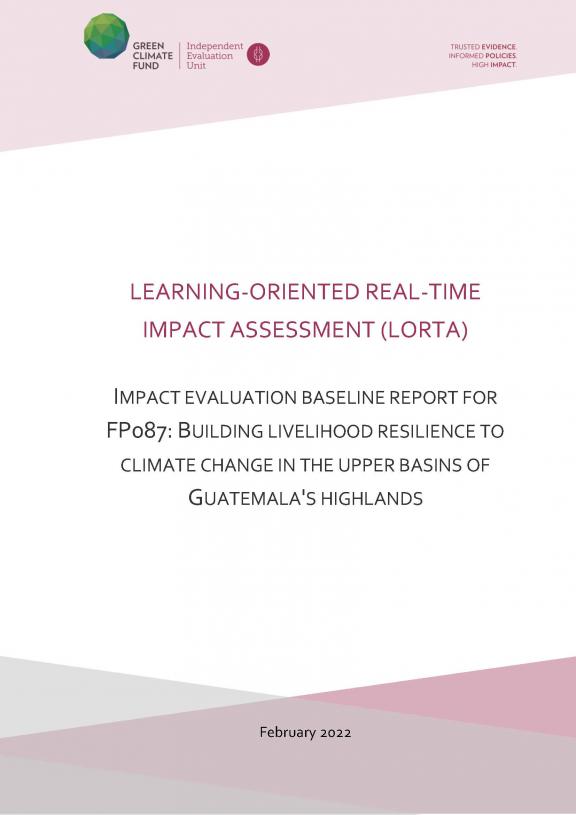
Impact Evaluation Baseline Report for FP087: Building livelihood resilience to climate change in the upper basins of Guatemala's highlands
May 2022
This document is the baseline report for the impact evaluation of the project FP087 "Building livelihood resilience to climate change in the upper basins of Guatemala"s highlands". The report outlines the theory of change of the project intervention as well as the evaluation questions and indicators.
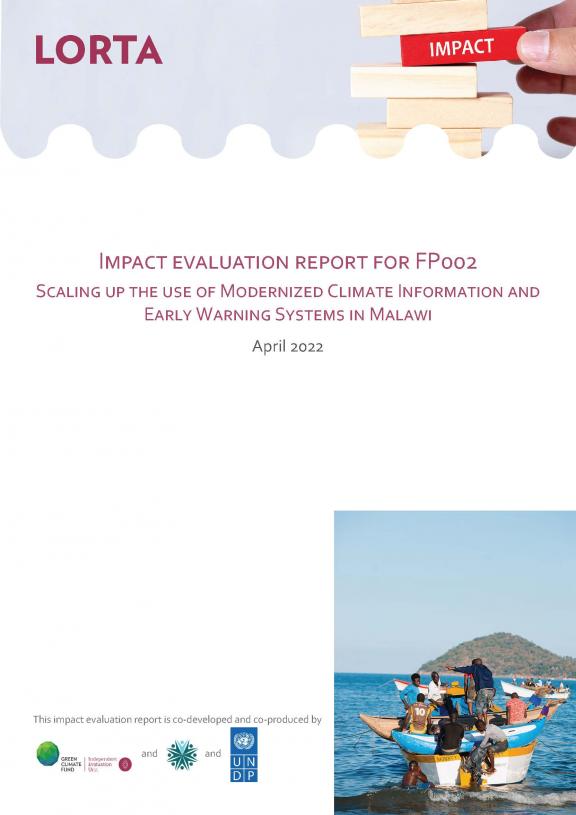
Impact Evaluation Report for FP002 : Scaling up the Use of Modernized Climate Information and Early Warning Systems in Malawi
May 2022
This report assesses the impact of the Green Climate Fund's FP002 "Scaling up the Use of Modernized Climate Information and Early Warning Systems in Malawi". The impact evaluation focuses on the Participatory Integrated Climate Services for Agriculture (PICSA) component of the projects and its impact on the climate resilience of farmers supported within FP002.
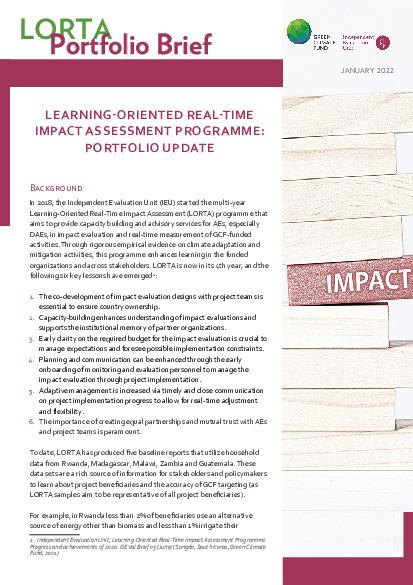
LORTA Portfolio Brief 2021
January 2022
The multi-year Learning-Oriented Real-Time Impact Assessment (LORTA) programme keeps track of the impact of GCF investments. Its goal is to assist GCF projects measure their impact in lowering greenhouse gas emissions and enhancing resilience to climate change, and if so, by how much. LORTA’s assistance includes, among other things, building and clarifying theories of change, co-building real-time and longer term measurement systems and helping projects use quantitative and qualitative...
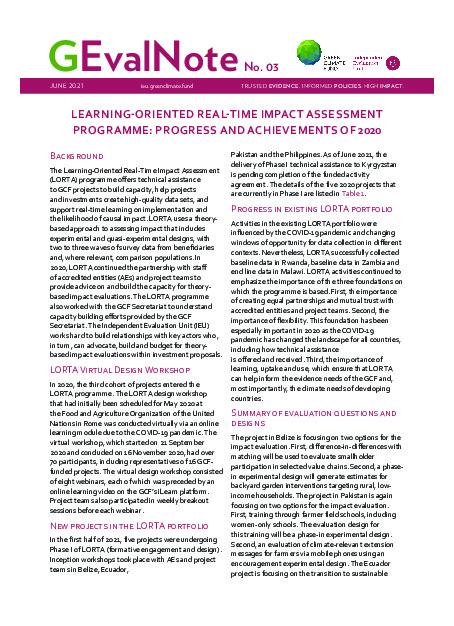
GEvalNote 03: LORTA 2020
June 2021
The multi-year Learning-Oriented Real-Time Impact Assessment (LORTA) programme keeps track of the impact of GCF investments. Its goal is to assist GCF projects measure their impact in lowering greenhouse gas emissions and enhancing resilience to climate change, and if so, by how much. LORTA’s assistance includes, among other things, building and clarifying theories of change, co-building real-time and longer term measurement systems and helping projects use quantitative and qualitative...
Pages
Behaviour and Design Lab
LORTA utilises some of the insights offered by the IEU’s Behaviour and Design Lab (BaD Lab) in terms of behavioural science approaches, including evaluating how behavioural interventions can enhance GCF investments.
